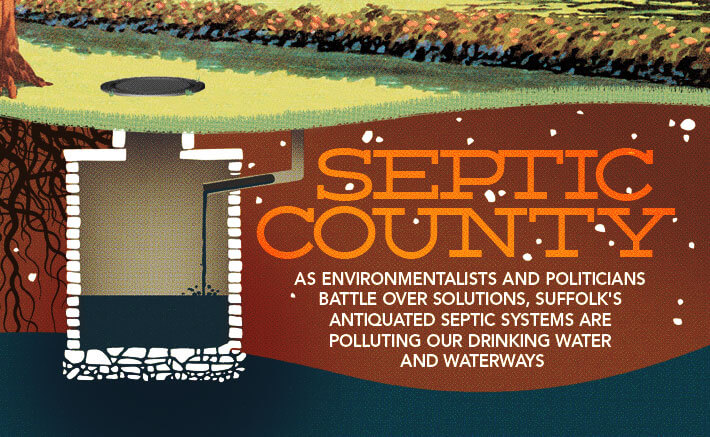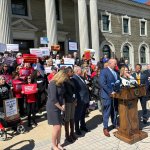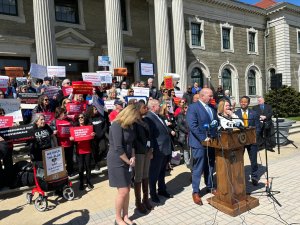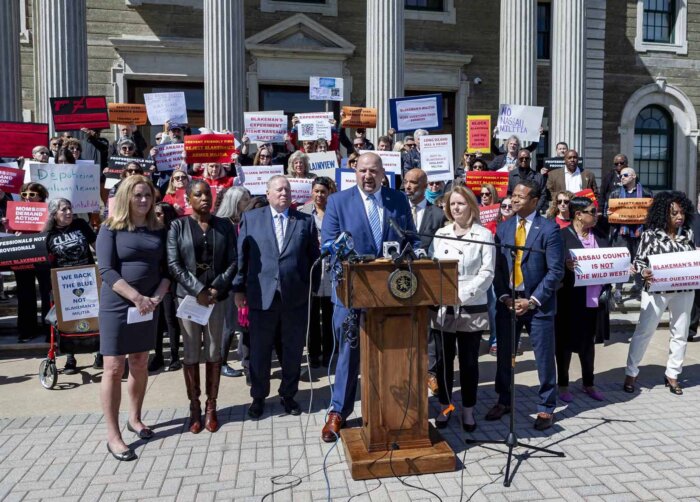DOWN THE DRAIN
Environmentalists direct special ire at Suffolk Legis. Tom Cilmi (R-Bay Shore), who after the draft report’s release, sponsored legislation that effectively stripped the county health department of implementing significant healthy policy changes without legislative approval. It passed nearly unanimously; former County Executive Steve Levy signed it into law.
Many environmental advocates allege the move was done preemptively to head off any potential policy changes that may be included in the revised final report—such as, for example, McAllister’s call for the de-certification and replacement of Cromaglass and antiquated cesspool and septic systems with the most efficient technology, such as Nitrex. Or perhaps improving the water quality nitrogen discharge standard from 10 milligrams per liter to 5 milligrams—mandates that would cost big money to implement. Critics charge that the motivation for such a law was less about protecting Long Island’s drinking water and ill-fated waterways and more about protecting deep-pocketed development interests and campaign contributors.
“The politicians are more concerned about protecting the special interests than the public health,” blasts Amper. “Within a month of the time that the health department’s report came out, the legislature, at the behest of developers, approved legislation that effectively says, ‘The health department is not allowed to do its job or promulgate any protective regulations unless we say so.’”
Motivated by outside interests or not, says DeLuca, the former health department employee, the new protocol just doesn’t make sense. He wants it repealed in tandem with the implementation of real, concrete plans on how to truly deal with the situation.
“It’s absurd, and I think it’s actually dangerous,” he says, “because what happens with legislation like that is that every public health decision becomes politicized. You don’t need 18 legislators trying to decide what’s good for public health. You need public health officials to decide that and, essentially, adopt rules and regulations that advance that.
“I think it’s very difficult for a public policy maker, who may not be a scientist and who may have absolutely no background or understanding as to what 10 milligrams per liter means—to sit there and basically pass judgment on some of the technical standards that are going to have to be put in place as we move forward,” DeLuca says. “There’s a reason why people [are] on the Board of Health and there are technical people involved in those health standards, because you need somebody with that level of competence—who is also not running for office—to be able to say with a straight face, ‘This is what we need to do and here’s why.’”
Cilmi tells the Press his legislation was “absolutely” influenced by the draft report and potentially expensive policy changes that could be coming from the health department down the road, stressing that it’s his job, as an elected official, to have a say in those decisions.
“My bill was in an effort to say, ‘Look, this report that was done is a very important report, it brings to light some very concerning facts about what’s going on with our environment, what’s going on with our waterways, what’s going on with our groundwater. But, when we’re going to make policy decisions based on those facts, that will have major impact not only on the future of our environment and public health, but also on the future of our economy, then those decisions are most appropriately made with counsel from all of the stakeholders, but made by the legislature.’
“I don’t want unelected administrative officials mandating anything,” he continues. “There are other implications to these decisions that need to be weighed along with everything.”
Regarding the allegations of campaign contributors’ influence:
“I won’t sit here and deny that I didn’t get phone calls from developers,” Cilmi says. “But you know what, in every decision that we make, we get phone calls from a myriad of stakeholders, and I wouldn’t want it any other way.”
McAllister, his environmental colleagues, and even the crafters of the county’s draft plan, argue that if the money is not spent on fixing the problem now, the cost will grow exponentially.
“Let’s say we’re doubling the cost, or even tripling the cost,” he says. “We’ve got to bite the bullet at some point, because we can’t continue to perpetuate the status quo because the status quo has brought us to a water quality crisis.
“Rome is burning.”



























